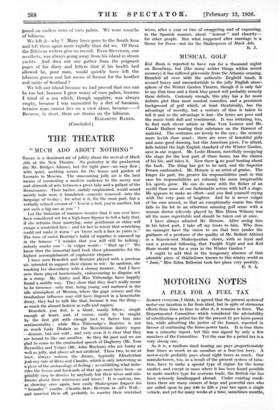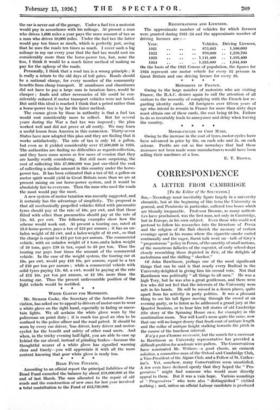MOTORING NOTES
A PLEA FOR A FUEL TAX
ALMOST everyone, I think, is agreed that the present system of motor-car taxation is far from ideal, but in spite of strenuous efforts from time to time to alter it, it remains in force. The Departmental Committee which considered the advisability of substituting a petrol tax for the present £1 per horse-power ' tax, while admitting the justice of the former, reported in favour of continuing the horse-power basis. It is true there was a minority report, but this was signed by only a few members of the Committee. Yet the case for a petrol tax is a very strong one.
As it is, a medium sized touring car pays proportionately four times as much as an omnibus or a four-ton lorry. A motor-Cycle probably pays about eight times as much. Our manufacturers, too, as a result of the present system of taxa- tion, have to make a special type of engine for the home market, and except in cases where it has been found possible to make another type for overseas trade, the British car has been seriously handicapped abroad. Under existing condi- tions there are many owners of large and powerful cars who are called upon to pay £40 to £50 a year tax upon a single vehicle, and yet for many weeks at a time, sometimes months, the car is never out of the garage. Under a fuel tax a motorist would pay in accordance with his mileage. At present a man who drives 1,000 miles a year pays the same amount of tax as a man who drives 10,000 miles. - Under the fuel tax the latter would pay ten times as much, which is perfectly just, seeing that he uses the roads ten times as much. I cover such a big mileage in my car every year that the fuel tax would cost me considerably more than the horse-power tax, but, none the less, I think it would be a much fairer method of making us pay for the upkeep of the roads.
Personally, I think that a road tax is a wrong principle ; it is really a return to the old days of toll gates. Roads should be a national charge, for every member of the community benefits from cheap transport. If omnibuses and charabancs did not have to pay a large sum in taxation fares, would be cheaper ; foods and other necessaries of life could be con- siderably reduced if motor transport vehicles were not taxed. But until this ideal is reached I think that a petrol rather than a horse-power tax is by far the fairer method.
The excuse given by those in authority is that a fuel tax would cost considerably more to collect. But for several years during the War a fuel tax was imposed ; the plan worked well and did not prove at all costly. We may learn a useful lesson from America in this connexion. Thirty-seven States have now adopted this plan and they are finding that it works satisfactorily. The rate of tax is only Id. a gallon, but even so it yielded considerably over £7,000,000 in 1924. The authorities are finding no difficulties as regards collection, and they have come across so few cases of evasion that they are hardly worth considering. But still more surprising, the cost of collecting this 17,000,000 was just one-third the cost of collecting a similar amount in this country under the horse- power tax. It has been estimated that a tax of 6d. a gallon on motor spirit would yield in Great Britain more than we are at present raising on our horse-power system, and it would be absolutely fair to everyone. Then the man who used the roads the most would pay the most.
A new system of motor taxation was recently suggested, and it certainly has the advantage of simplicity. The proposal is that all mechanically propelled vehicles fitted with pneumatic tyres should pay at the rate of 10s. per cwt, and that those fitted with other than pneumatics should pay at the rate of 12s. 6d. per cwt. The following examples show how the scheme would work out. At present a touring car, rated at 23.9 horse-power, pays a tax of £24 per annum ; it has an un- laden weight of 33 cwt. and a laden weight of 40 cwt., so that the charge is equal to £12 per ton per annum. The commercial vehicle, with an unladen weight of 4 tons, and a laden weight of 10 tons, pays £30 in tax, equal to RS per ton. Thus the touring car pays four times the amount of the commercial vehicle. In the case of the weight system, the touring car at 10s. per cwt. would pay £16 10s. per annum, equal to a tax of 210 per ton per annum ; while a commercial vehicle with solid tyres paying 12s. 6d. a cwt. would be paying at the rate of £12 10s. per ton per annum, or £2 10s. more than the touring car. Thus the present unfavourable position of the light vehicle would be rectified.



















































 Previous page
Previous page